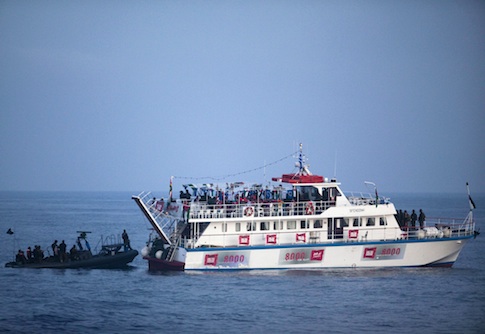JERUSALEM—Five years after nine Turkish activists were killed in an attempt to break through Israel’s naval blockade of the Gaza Strip, a vessel attempting the same mission was boarded Monday by Israeli naval commandos and directed to an Israeli port. A military spokesman described the seizure of the ship as "uneventful."
The small Swedish vessel, Marianne, was carrying 18 activists from several countries, including a former president of Tunisia. It was part of a four-vessel "flotilla" bound for Gaza, but the three other boats turned back after the Marianne, which was sailing ahead of them, was boarded. A spokesman for the flotilla said Israeli navy acted like "state pirates," but there were no reports of violence.
The protest contrasted sharply with the challenge posed by the six-ship flotilla organized in Turkey in 2010 with the blessings of Prime Minister Recep Tayyip Erdogan. Although the declared humanitarian objective of that voyage drew hundreds from around the world who saw it as a peaceful demonstration on behalf of beleaguered Gazans, the flagship of that flotilla, the Mavis Marmara, harbored a hard-core group of Turkish militants who were determined to meet any Israeli boarding with force.
The naval commandos descended onto the upper deck of the vessel by rope from a helicopter. They carried paintball guns as a visible deterrent, but had hidden weapons. The commandos who neared the deck first were hit with iron bars. Some were stabbed. At that point, the order was given to draw weapons. Nine of the militants were killed and a tenth died several years later after being in a coma. Dozens of the militants and 10 of the commandos were wounded.
Erdogan would subsequently term the incident "a cause for war" but he did not go beyond recalling the Turkish ambassador to Israel and expelling the Israeli ambassador in Ankara. Although diplomatic relations were not severed, neither country has an ambassador in the other.
A United Nations committee that investigated the Mavis Marmara incident determined that Israel was in compliance with international law when it declared a blockade to prevent weaponry from reaching the Gaza Strip.
Those aboard the Marianne made it clear in statements beforehand that there would be no resistance. In addition to the previous president of Tunisia, Moncef Marzouki, those aboard the vessel included an Israeli Arab Knesset member, a Jewish former Israeli, a member of a European legislature, and activists from several countries. All except the Knesset member, Basel Ghattas, who has parliamentary immunity, are expected to be deported via Israel’s international airport, probably Tuesday, after they have been questioned by security officials.
Prime Minister Benjamin Netanyahu called the flotilla affair "a demonstration of hypocrisy and lies that assists the Hamas terrorist organization and ignores all the other horrors in our region" such as the 300,000 Syrians killed in the past four years of civil war. Although the country has maintained a naval blockade to prevent delivery of rockets and other weaponry, there is no siege of Gaza, Netanyahu said. He said that some 800 trucks enter Gaza from Israel every day with civilian products.
Since last summer’s war in the Gaza Strip, attention has been focused on been the import of building materials, particularly cement, to rebuild extensive parts of the Palestinian enclave destroyed in the fighting. Israel supervises these materials to prevent Hamas from using them to build attack tunnels. A UN official involved in the reconstruction project, Robert Valent, has called on Israel to let more materials through. These materials arrive by land, not sea. The organizers of the flotilla said in a statement that the object of the Marianne’s voyage was "to deliver its cargo of dignity and hope".
Noting the presence of the former Tunisian president among the protestors, the editor of the Times of Israel, David Horovitz, wrote in an op-ed that Marzouki, who was president until last year, was helping demonize Israel "as the ostensible source of Gazans’ suffering." In the wake of this weekend’s mass killing of tourists by a Tunisian university graduate, Marzouki would make better use of his reputation and time, Horovitz suggested, if he publicly noted that "thwarting Islamic extremism is the region’s key imperative."
Israel Television said the Marianne would not be brought into Ashdod port until after dark to foil the activists’ intention to achieve maximum publicity.
